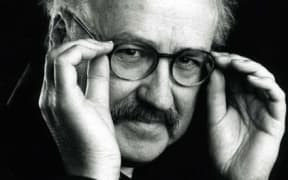Lyell Cresswell
Lyell Cresswell (b.1944)
Violin Concerto (1970)
Performers: Alex Lindsay (violin), NZBC Symphony Orchestra, Edwin Carr (conductor)
Recorded in Radio New Zealand's Wellington Studios
24 March 1971
Introduction by Kenneth Young
Although he won't like me saying so, Lyell Cresswell has become an elder statesman of New Zealand composition since the passing of Lilburn, Carr and Farquhar. He's lived in Scotland since the early 1980s, however he still considers himself a New Zealand composer and it was special to have him back here as the New Zealand School of Music Composer in Residence in Wellington in 2006 and 2007.
He also organised two separate week long festivals of New Zealand contemporary music in Edinburgh in 1998 and 2001. I was fortunate to conduct at both these events and it was wonderful witness the enthusiasm and skill of the local performers, in particular the BBC Scottish Symphony Orchestra, but also the appreciation of the local audience. The final night parties weren’t bad either, given that Lyell has a splendid selection of single malt scotch.
Lyell Cresswell was born in Wellington in 1944 and initially studied with Douglas Lilburn and David Farquhar at Victoria University where he also came under the influence of Professor Frederick Page, who had been to Darmstadt in the 50s and passed on his aesthetic leanings to Wellington's young and indeed not so young composers.
Further studies took Cresswell to Toronto, Aberdeen and Utrecht. He taught at Glasgow University, held fellowships at Glasgow and Edinburgh universities, and settled in Edinburgh in 1985 as a freelance composer.
He's now one of the most sought after composers in Great Britain. He's been commissioned by major orchestras and festivals worldwide and his output is extremely varied. Concertos, orchestral works, chamber and vocal works of all shapes and sizes make up his catalogue of over 100 works.
One thing he is justifiably famous for is interesting titles. My particular favourites are The Pumpkin Massacre, a work for strings; Prayer for the Cure of a Sprained Back for solo mezzo soprano; and Le Sucre de Printemps, a wonderful word play on Stravinsky's masterpiece.
The work we're going to hear tonight is an early Violin Concerto from 1970, written at the age of 25 while he was studying in Toronto. Lyell tells me it was his first orchestral piece, and here I quote, "it's kind of twelve-tone but strays in various directions from this". A delicious understatement. However, one could also describe it as almost a curiosity as Cresswell has hardly used Serialism since.
In the space of 12 seconds he's stated the tone row twice, with a shock chord in the winds and a glissandi passage in the strings. As the work progresses, we can hear many of the characteristics of Cresswell's later works; sudden extremes of register and dynamic, cluster chords in extreme registers, a delight in effects such as trombone glissandi, and most of all his trademark intense and vibrant urgency.
The work is scored for a large orchestra of strings, triple wind, full brass and five percussionists. For me the effect is often of the violin soloist in a lone battle against the might of the orchestra.
In the second movement there is the rather odd time signature of 25/8 - yes, there are 25 quavers in the bar; I counted them. Cresswell toys with repeated rhythmic cells in the percussion set against the solo violin's broader, more lyrical playing.
The third and final movement is probably what Lyell was referring to when he said the piece strayed in various directions. It opens with long, held twelve-note chord clusters, followed by a complete contrast: frenetic string passages which still use the twelve-note series while employing every possible special effect and technique. After that, there's a measured woodwind passage which may sound aleatoric, but it has every instrument employing all twelve notes in separate, individual rhythmic patterns. Fun and games!
Just as a humourous addendum, at the very end of the work the first trumpet sings a distorted and raucous Now is the Hour before the percussion are left alone to quietly fade away.
